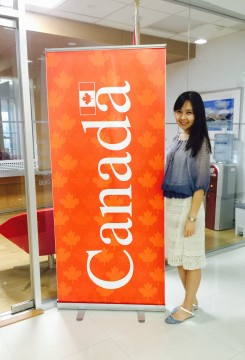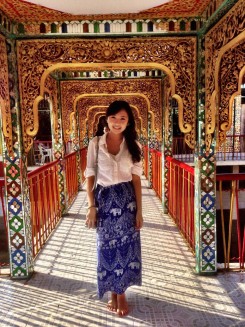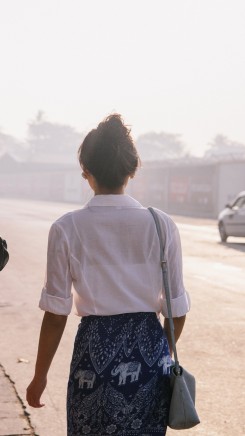From the months of September to April, many students at U of T remain within the vast social, academic, and professional network of this university and the Greater Toronto Area. Across all three campuses, U of T students are constantly undertaking remarkable experiences. Perhaps, though, the full potential of our community’s zest for life and sense of exploration is most evident in the four months between the end of winter term and the beginning of fall. This summer series covers but some of the adventures and challenges of U of T’s bold and ambitious globetrotters.
Chapter two: Encountering Myanmar’s metropolis
When Alice Niu departed from Yangon, Myanmar at the end of reading week in February, she did not expect to be flying back less than three months later — this time to stay for several months as an intern at the Canadian Embassy.
Niu, a third year student, travelled to Yangon, Myanmar, for a university funded International Course Module (ICM); along with 9 other students, she studied democratization and the tensions forming ahead of the upcoming Burmese general election.
Pursuing a double major in contemporary Asian studies and ethics, society, and law, Niu’s knowledge and experience certainly helped her obtain the position. As part of the ICM in February, she met with various non-governmental organizations and political leaders — as well as the Ambassador from Canada to Myanmar, who told her about the internship.
“I think the fact that I knew a little bit more about the country than the other candidates gave me sort of an edge beforehand,” she says. “ …Not a lot of undergrads study Burma.”
As a political intern at the embassy, Niu has many responsibilities. She prepares reports that are posted to the Department of Trade and Foreign Affairs website, and assists visitors to the embassy. She even attends meetings with organizations like the United Nations Development Programme and the European Union — though, she adds sheepishly, she’s mostly there to take notes.
In light of her experiences, Niu is considering a graduate degree in Asian studies or development. She is interested in exploring how her international experience can translate into a career. “If I [want to] pursue a job in foreign service, having…specialized knowledge in these Asian countries would help me wherever I am placed,” she says.
When she is not working at the embassy, Niu plans to keep herself busy by continuing to study Myanmar’s democratization. This is made possible for Niu by a summer research grant she has been awarded from the Asian Institute, located at the University of Toronto’s Munk School of Global Affairs.
The new environment is a welcome change for a student who took consecutive summer school terms in the summer prior to her third year.
Reflecting on her decision to travel, Niu outlines the many difficulties she could be facing back home. “You have to juggle through school, through extra-curriculars, through families, through relationships… Being in Yangon, it’s sort of getting away from it all…You’re still doing something productive, but you’re in a working environment.”
As I talk to Niu, she describes the cityscape outside the large window in her apartment. Looking out at the city that she is so keen to explore, she notes many similarities to Toronto; extensive green space and a wide variety of restaurants among them.
The city is also undergoing consistent maintenance, which explains the multiple construction sites she passes on her walk to work.
“Many parts of the buildings are not [yet] high-rises,” Niu explains. “There are a lot of buildings that need to be reconstructed… If you go around the city you see a lot of buildings being torn down, lots of construction sites, and that’s super similar to Toronto.”
And yet the move to Yangon also includes some stark adjustments, including, Niu explains, navigating a privatized and generally unruly transit system. Though most tourists travel by taxi, Yangon also has a hectic traffic environment, making transport a risky business. Drivers have grown accustomed to dodging pedestrians, who often cross the street between incoming vehicles.
Niu also notes the common practice in Yangon of selling fresh produce right on the sidewalk; street markets provide an alternative to ordinary grocery stores.
“Street markets are [generally] just local farmers,” Niu explains. “It’s something that Ontario is trying to achieve, local farmers and produce. But here in Yangon it’s like the normal thing to go to these street markets and buy these things.”
Any new environment requires a transition period. Niu confesses she is still suffering from jet lag, as a result of the ten-and-a-half hour time difference between Yangon and Toronto. Differences in the lifestyle also take some getting used to.
“ …I don’t speak Burmese, and I’m so used to being able to indicate what I want, in English,” Niu explains. “ …Here it’s [reverting] back to sign languages, of course.”
Other changes come more easily to Niu. “I feel rich all the time because the currency is in thousands,” she adds, laughing.
When asked if she would recommend an international experience to other students, Niu offers some advice.“[Experiences] that allow you to do research, I highly recommend that because that shows initiative,” she says. “That shows your interest, that shows you are ahead of the game in terms of having research skills developed prior to going to grad school.”
Ultimately, she advises others to pursue travel that enhances their educational aims. “You just have to make sure your international experience is going to be highly relevant to the field that you’re going into,” she explains.





